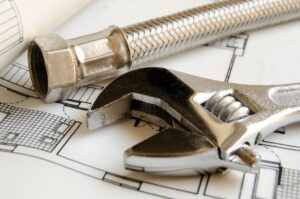We’ve all seen flexible plumbing lines. They’re those cool looking pipes with an almost woven aesthetic to them. You can bend them into place and they don’t leak. No, it’s not magic, it’s twisted steel that forms together into a pipe that can be placed in any position!
However, flexible plumbing lines should not be used for everything. They’re a niche product and they have very specific uses that can make them handy in a pinch. But they’re not supposed to replace every pipe in your home, or you might end up in an over-engineered nightmare.
So, as your local team of expert plumbers, we’ll let you in on some of the industry pros and cons of using these kinds of pipes. They’re a handy tool for plumbing service in Turlock, CA, but they’re not a one-size fits all solution!
How Flexible Lines Work
Flexible pipes are composed of resistant steel that have been woven together to form an airtight seal. They’re great at two things, holding the flow of water and bending into a shape that works for your appliance or specific room.
If you look at your toilet’s intake, or the water line that heads into your sink, you’ll likely see a flexible plumbing line. This is because they’re easy to fit into the specific position that your sink or toilet requires, and they’re also great for hot or cold water.
Here is a breakdown of some of the pros and cons of these types of pipes.
The Benefits of a Flexible Pipe
Flexible pipes have some great unique benefits that make them a must-have for certain types of plumbing appliances.
- They’re especially convenient. Being able to replace your appliance, like a washing machine or a sink, and then worry about the water line connection later, is a huge blessing.
- They work. As long as they’re tightly sealed, they’ll work without any leaks.
- They can handle hot water just as well as cold water. And, they’re pretty strong for being so flexible.
The Negatives of a Flexible Pipe
However, it’s important to remember that different pipes are required for different solutions, a flexible pipe might not be the best choice for your next plumbing project. A professional will be able to give you more details, but here’s just a glimpse.
- Flexible water lines only last 5-10 years. The flexibility means they’re thinner and more prone to corrosion, leading to a lower lifespan than other pipes. This is important, and it means that you’ll be spending more on plumbing work in the future.
- Flexible lines can leak when twisted too much. They’re durable, but what they gain in flexibility, they lose in durability. They’re incredibly thin, so you might find broken seals and leaks more often with flexible lines.
- It’s easy to over-engineer your home plumbing system with flexible lines. You don’t want a twisty, curvy mess of pipes in your basement.
Go With a Plumber’s Recommendation
Making the choice of what kind of pipe or flexible line to use can be hard. A professional plumber knows exactly when a situation might best be handled with this kind of material.
Contact DeHart Plumbing, Heating, and Air Inc. for comprehensive plumbing work you can count on.


